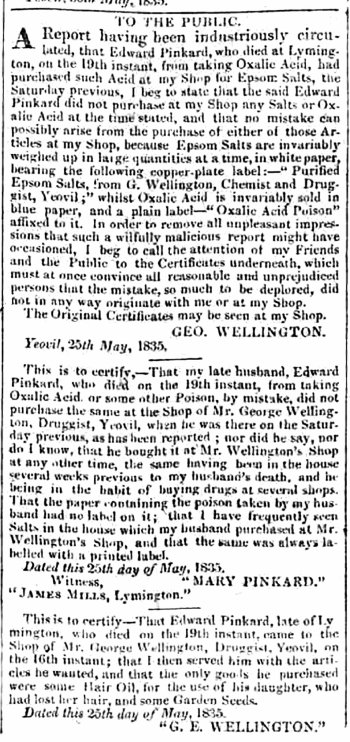yeovil people
george Edward wellington
Chemist, Druggist, Grocer and Oil & Colour Man
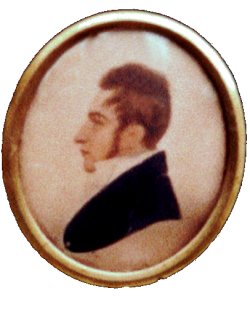 George
Edward Wellington,
shown in a
miniature at
left, was
born on 26
January 1781 in
Chard, the son
of John
Wellington
(1747-1827) of
Chard and Molly
née Bowden
(1753-1830)
originally of
Honiton.
George
Edward Wellington,
shown in a
miniature at
left, was
born on 26
January 1781 in
Chard, the son
of John
Wellington
(1747-1827) of
Chard and Molly
née Bowden
(1753-1830)
originally of
Honiton.
On 26 November 1803 he married Elizabeth Edwards in Yeovil. They were to have four children George Edwards born 1807, Mary Webb born 1808, Sarah born 1812 and John born 1815. Both Elizabeth and baby John died in 1815.
His daughter Mary was to marry Yeovil solicitor James Tally Vining in 1833 but she died in childbirth in 1842 and her tomb is in St John's churchyard.
On 22 September 1817 at Wayford, near Chard, George married Elizabeth Jane Sampson. George was aged 36, Elizabeth was 23. They were to have ten children; Jane Penelope (b1818), Susannah (1819-1838), Richard George (b1820), Frances Elizabeth, known as Fanny, (b1822), Rosa (b1823), Frederick George Noble (b1824), Lucy (b1826), Richard (b1827), Rebecca (b1834) and Ellen Mariana (b1840).
George Wellington was a chemist, druggist, grocer and wine merchant, his premises being in the Borough. The churchwardens of St John's church had an account with him for the supply of oils, paints and candles for the church and was listed in the accounts almost annually between 1815 and 1836. He was listed as a grocer of the Borough in Pigot's Directory of 1824 and as a 'Chymist & Druggist' of the Borough in Pigot's Directory of 1830. He was listed in the Voter's Lists between 1832 and 1841 in respect of freehold houses he owned in the Borough.
George Wellington's premises were described in a notice of let (see Gallery) from the 25 March 1830 edition of the Dorset County Chronicle in which the property is described as "A comfortable and Convenient Dwelling House, situate in the centre of Yeovil Borough, now in the occupation of Mr George Wellington; consisting of a dining-room, drawing-room, breakfast parlour, servants' hall, kitchen, back kitchen, six bed-rooms, six attics over the same, laundry, and spacious underground cellars; together with a Lawn in front of the House; a four-stalled Stable, a Garden and Green-house behind."
George was a Freemason, initiated into the Lodge of Brotherly Love in Yeovil in 1820. In 1835 both he and his son George Jnr were two of the five trustees of the newly-formed Yeovil Guardian Friendly Society.
In public life George was a member of Yeovil's Vestry, a burgess and served as Portreeve between 1813 and 1820. He was also the Assistant Overseer of the Poor for the parish as well as being a churchwarden in 1840 and 1841. The 29 March 1845 edition of the Sherborne Mercury reported on a meeting of the Vestry, in which it was noted "... it was expedient that Mr John Alexander, Mr Edward Raymond, Mr John Brook Junr. and Mr George Wellington (the present Overseers), should be reappointed to perform the duties of the office of Overseers for the year ensuing."
In 1834 he was listed as a subscriber to William Hull’s “History of the Glove Trade”.
George Wellington wrote the following letter to his daughter in 1839 outlining some of the medical problems being suffered by his children.
|
Wednesday, May 1st 1839 My Dear Child, Yours of yesterday with the account of the death of my dearly beloved Bessie have cast such a dark cloud over me that I scarcely know how to address you my dear children. You are bereaved of one of the best of children, but now your loss is her gain, for I have not the slightest doubt that she is now a happy angel in Heaven. I hope to be with you as early as possible on Saturday, where I would have wished to be ever since last November, but one thing or another have prevented me. I can say no more at present but will leave you all until we meet, if it shall so please the ruler of all things.
Saturday, May 4th 1839 My Dear Child, Thursday, since you will have had my last scrawl, we received a bad account of Lucy, sent for her on Friday, she has had fits 3 times before a Miss Smith wrote to us. Mrs Morris is attending to her, it is water on the brain. She has had leeches on twice, her pulse yesterday 120, but she is feeling better today and sitting up. Mary's dear babe is still alive but no chance of recovery, she has had 7 fits during the night and is very weak. Your Grandma came to George's yesterday, she is quite well and desires her love to you and Mr Groves, and will write to you soon. Mr Vining and Mary, indeed all here unite in love of you. I can say no more but hope you and Mr Groves will be strongly supported under this severe affliction which is indeed a severe trial.
Adieu,
adieu my
dear
child,
and
believe
me to be
|
George was a burgess of Yeovil for several years and served as Portreeve from 1813 to 1820. He maintained of particular interest in local affairs and on the passing of the Improvement Act of 1830 was elected as a Town Commissioner and played a key role in the early development of the town. The bulk of the work of the Commission was largely carried out by six members which included George Wellington who put in 47% of possible attendances. He was one of only four of the original Commissioners formerly a Burgess of the old Corporation, the others being John Greenham, Josiah Hannam and surgeon Moore.
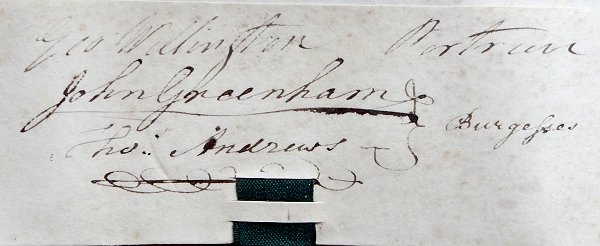
From my
collection
George Wellington's signature as Portreeve and the signatures of Burgesses John Greenham and Thomas Andrews on a lease, dated 1815, for a property in South Street.
In June 1835 the House of Commons began debating the Municipal Corporations Reform Bill but excluded Yeovil from the towns to which it would apply. The Yeovil Corporation Committee, set up by a public meeting, petitioned Parliament for Yeovil's inclusion in the bill. The petition was presented to Parliament on 13 July by George Wellington and John Greenham, the two oldest burgesses. When they returned to Yeovil from London they were greeted "with exultation, their horses removed and their carriage drawn entrance through the town". Nevertheless in August the House of Lords struck out Yeovil from the list of boroughs covered by the bill without discussion.
In 1840 George took Chancery proceedings against Robert Jennings regarding the disputed election of Portreeve. George's costs and expenses, in the sum of £540 (over £400,000 at today's value) was borne by the Corporation.
By trade George was a druggist (chemist) of High Street and was recorded living there in the 1841 census. By this time he was aged 60 and was living there with his daughters Jane, Fanny, Rosa, Rebecca and Ellen. His wife Elizabeth was vacationing in Weymouth with her ladies maid, and his youngest son Frederick was away at boarding school. Also listed in the household were staff and servants – a druggist’s apprentice, three young shop hands and a ten year old female servant.
Between 1835 and 1845 George Wellington was expanding his business. He was in partnership with his eldest son George Jnr, and they opened a second shop in Glastonbury in about 1838. The General Directory for the County of Somerset 1840 lists 'George Wellington & Son, Chemists & Druggists' and also as 'Grocers & Dealers in Sundries', with businesses in High Street, Glastonbury and the Borough, Yeovil.
He was an influential Yeovilian and in March 1846 he was appointed Overseer at the Annual Vestry, together with John Swatridge, Thomas Busby and John Newman Berkeley.
George died in Yeovil on 10 November 1847 (not 1848 as carved into his memorial, below). The Coroner's verdict at the inquest into his death determined that he was "found drowned" - see the report below.
|
DEATH OF
MR
WELLINGTON Sherborne Mercury, Saturday 20 November 1847 On Saturday last, shortly after the publication of our paper, in which we stated that all efforts to find this unfortunate gentleman were unsuccessful, Inspector Holt proceeded to a deep marl-pit, in a field called Coomb Street, belonging to Mr Mayo, about half a mile out of the town, and there discovered the body of Mr Wellington, who had evidently been dead some days. The pits is supposed to be about forty feet deep, and is surrounded with bushes and trees on all sides but one, which is open for the cattle to drink. The line fixed to the grappling iron with which the inspector or drew up the body was nearly thirty feet long, and it required the whole length of it to reach him. The body when taken up was removed into an adjoining building, and an express sent off to Shepton Mallet for Mr Ashford, the Coroner, who arrived shortly after and held an inquest on the body at the Duke of York. A highly respectable jury was summoned, consisting of the following gentleman :- Mr Etheridge (Foreman), Messrs C Plaister, EJ Latham, Bret McTier, J Hood, W Baker, T Samways, J Swatridge, T Stent, T Barter, B Neal and J Rawlings. The jury having been sworn, proceeded to view the body, and on their return the following evidence was taken. Mary Hockey stated -- I live with Mrs Wellington, and am servants there. I saw the deceased last, on Sunday evening, he was at home, Mrs Wellington and her four daughters were at home with him. He went out to church in the evening and returned about half-past eight o'clock. He took supper with the family, and ate his supper as usual. When I went to bed at ten o'clock I left him in the parlour; I heard him come upstairs about a quarter of an hour after. That was the last time I saw him. He appeared as usual, and I saw no alteration in his conduct or manner. I don't know what time he got up in the morning. I saw no more of him after, he was gone before I was up. When I went out to open the shutters I found the door was unfastened. His slippers were at the bottom of the stairs, and I thought he was in bed. I did not know he was not in bed until Mrs Wellington came down, and there was a man came in to go to work. By Mr Plaister -- I did not tell Mrs Wellington about the door being open, because I thought he had forgotten to bolt it. Several questions were put to the witness relative to the customary habits of the deceased, but she was unable to answer them satisfactorily, having lived with the family only about a fortnight. By the Foreman -- Mr Wellington's daughter, Mrs Sutton, came home on Sunday with two children. Mr Sutton did not come with them. She came on a visit, and was going on Monday morning. She wanted to see master before she went, but could not, she then stayed until Wednesday, when she left. In reply to a Juror, the witness stated that she came downstairs about half past six o'clock on Monday morning. Mr Thomas Heyward said -- I saw Mr Wellington last in the afternoon of yesterday week, at the Mermaid Hotel, he was there collecting the rates of the farmers. He was looking for Mr Thomas Pope, one of the Churchwardens of the parish of Yeovil, to get an order signed for the removal of a pauper. He got the order signed and then left the room, I never saw him after that alive. The last time I was with him on business about the rates, was on Tuesday week, the 2nd inst., When I was with him about two hours or more at his own house; during which time he repeated more than 20 times the expression "I am broken hearted," and said he did not know what to do with himself. We were talking about his situation, and his pecuniary embarrassments. He several times arose from the chair and paced the room with the greatest agitation possible. I had lately found him very much and dejected and absent in mind before this occasion. I had found him so absent in mind that I have been myself obliged to go up to his house and remind him of particular things which he had to do in regard to his duties as assistant overseer. Mr Thomas Holt, the superintendent of police at Yeovil, said -- I knew Mr Wellington very well; he had been missing for some days. I searched for him every day since Monday last (except Friday). There had been a great many other persons also searching for him. From information I received this morning, I went to a pit belonging to Mr John Mayo, in Coomb Street. I found the pit so deep that my line was not long enough, I therefore lengthened it, and the second time I threw, the grappling iron caught hold of the legs of the deceased, who was drawn to the surface with his feet upwards. We conveyed the body to the place where it's now lies. The pit is large and very deep, and is enclosed entirely around except on the side where the cattle go to drink. The pit is 40 feet deep in some parts, and must have been from 15 to 20 feet deep where the body was found. The jury returned a verdict that "The deceased, George Wellington, was found drowned in a pit in a field in the parish of Yeovil, called Coomb Street, but by what means he came into the water there is no evidence to show." On Monday the remains of Mr Wellington were consigned to the tomb. The funeral was attended by a large number of respectable inhabitants, and the churchyard was thronged by many of the humbler classes, who gave vent to their sorrow in exclamations and tears. He was greatly beloved and respected by all classes, and to the poor he was ever a firm and attached friend, always ready to relieve their wants and to assist them in the hour of distress. His memory will long be cherished in Yeovil, and by the poor with a grateful remembrance. |
After George's death Elizabeth moved to South Petherton where she lived with her son Frederick, a chemist and grocer, and his family. She died in 1865.
gallery
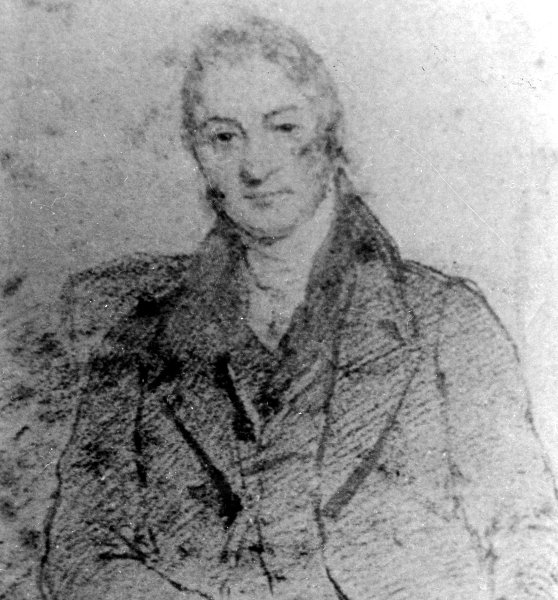
A pencil sketch of George Wellington, 1781-1845
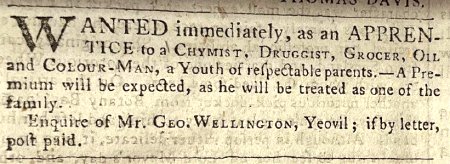
An advertisement from the 21 December 1804 edition of the Dorchester & Sherborne Journal, Taunton & Somerset Herald in which George Wellington seeks an apprentice. It is interesting the Wellington described himself as a "Chymist, Druggist, Grocer, Oil and Colour Man".
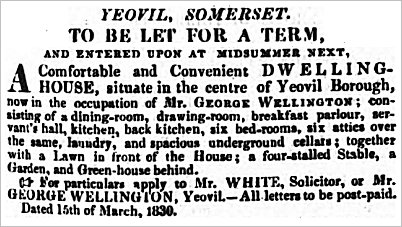
A notice of let of George's premises in the Borough, from the 25 March 1830 edition of the Dorset County Chronicle.
|
The
Western
Flying
Post and
Sherborne
Mercury,
1 June
1835. |
|

The notice of George Wellington's appointment as Overseer in the 28 March 1846 edition of the Western Flying Post.
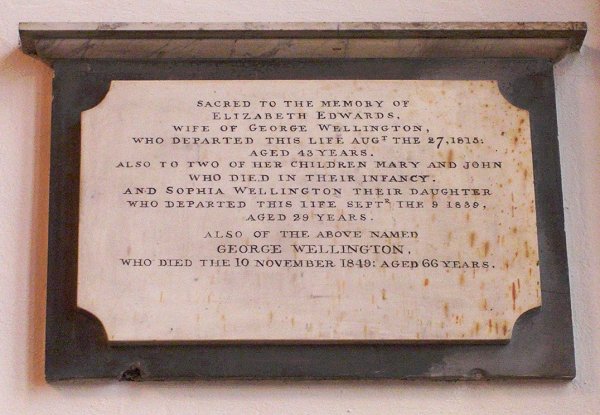 May
Memorial erected
to the memory of
George
Wellington and
members of his
family in St
John's church.
The date of
George's death,
here shown as
1848, is
incorrect since
he died in 1847.
May
Memorial erected
to the memory of
George
Wellington and
members of his
family in St
John's church.
The date of
George's death,
here shown as
1848, is
incorrect since
he died in 1847.
